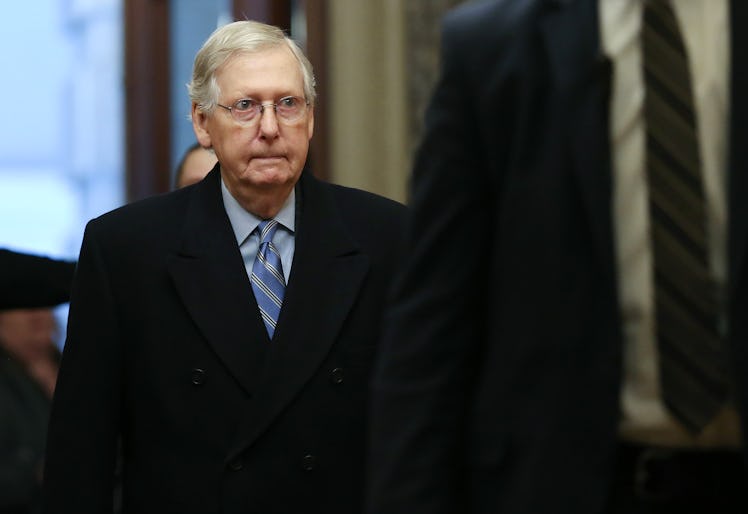
The Senate Vote On Calling Impeachment Witnesses Is A Game Changer
On Friday, Jan. 31, after months of investigations and debate, the Senate voted to bar additional witnesses from testifying in President Donald Trump's impeachment trial. The close 49-51 vote came on the heels of hours of debate and a 16-hour question period, during which Democratic lawmakers attempted to convince their more moderate Republican colleagues that the Senate should call witnesses. However, the Senate's GOP majority ultimately voted down the idea.
For weeks, Democrats have called for key witnesses, including acting White House chief of staff Mick Mulvaney and former national security advisor John Bolton, to testify in Trump's impeachment trial. However, Senate Majority Leader Mitch McConnell has been rejecting witness testimony requests from Democrats since before Trump was actually impeached by the House of Representatives on Dec. 18. As a result, Democrats have spent the duration of Trump's impeachment trial trying to convince moderate Republican senators to join them in calling for witnesses. In particular, Democratic lawmakers focused a large chunk of their attention trying to sway Utah Sen. Mitt Romney, Maine Sen. Susan Collins, Tennessee Sen. Lamar Alexander, and Alaska Sen. Lisa Murkowski.
The president was impeached in mid-December on two charges of obstruction of Congress and abuse of power, in relation to a summer 2019 phone call in which he asked Ukrainian President Volodymyr Zelensky for a political favor and withheld aid to Ukraine around the same time. The president has denied wrongdoing and his lawyers called the case against him "defective."
But the question of witnesses became more urgent in recent days, as key officials indicated they had information to share regarding the impeachment trial. In particular, an unpublished book manuscript by Bolton raised questions about Trump's defense that his request to Zelensky and the delay in Ukrainian aid were unrelated. In the book, Bolton reportedly claimed the president had asked him to help put pressure on Ukraine to investigate his domestic political rival, Joe Biden. The president's lawyers dismissed the manuscript, calling it "unsourced allegations."
On Jan. 30, Collins announced that she would break with her party to support Democrats' calls for witnesses. Romney also previously said that he would likely vote to allow witnesses. However, Alexander released his own statement shortly after Collins' announcement, declaring that he would vote against a motion to subpoena witnesses during the trial. Then, just ahead of the vote on Jan. 31, Murkowski also announced that she would vote no on witnesses, effectively sealing the motion's fate and making it more likely that Trump would be acquitted.
Before Murkowski finalized her decision to vote no, there was speculation that she would side with Democrats and create a tie. Had there been a 50-50 tie in votes, the subpoena motion likely would have failed anyway. Supreme Court Chief Justice John Roberts could have theoretically intervened if a tie occurred, but he was not expected to do so, per NBC News. In any case, the Senate's GOP majority succeeded in its efforts to bar witnesses from testifying the trial, and Republicans are expected to bring the trial to a swift close. That means that the Senate could move to acquit Trump as early as Friday night or Saturday morning, NPR reported.
The Senate's vote to block witness testimony was the last major phase of Trump's impeachment trial, which started on Jan. 21 after a great deal of back-and-forth between McConnell and House Speaker Nancy Pelosi. However, Senate Republicans may not immediately achieve the swift acquittal they seek. According to BuzzFeed News, Senate Minority Leader Chuck Schumer and other Democrats could introduce a variety of amendments and motions now that the witness motion has been shot down, which could keep the trial going for a few more days.